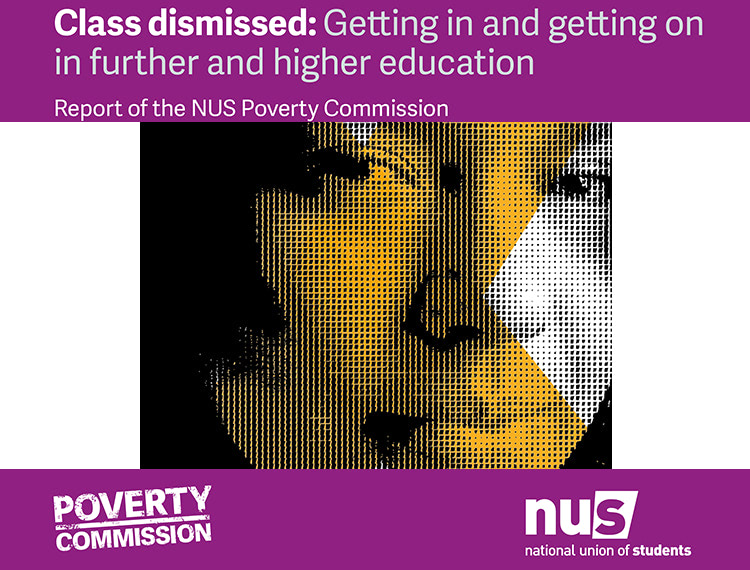#ClassDismissed NUS Poverty Commission report – Sector Response

The NUS Poverty Commission today (23 Apr) published their report, “Class dismissed: Getting in and getting on in further and higher education“.
NUS established the Poverty Commission to bring issues of class and poverty in post-16 education to light – and to ensure the focus was on post-16 education as a whole rather than undergraduate study alone. The Poverty Commission aims to address barriers facing working class students when it comes to access, retention and success in post-16 education.
This report summarises the findings and recommendations arising from initial research into these areas.
In a society where class still determines too many outcomes, and poverty is on the rise, it is more important than ever to understand the barriers to accessing – and excelling in – post-16 education for working class people, and the ways in which poverty affects students’ ability to enter and succeed in tertiary education.
The Commission took a collaborative approach to identify both problems and potential solutions. There were two main strands to its initial fact-finding work. First, they asked students, students’ unions, academics, further and higher education sector agencies, trades unions, and business, charity and campaign groups to submit evidence on income and post-16 education.
The call for evidence was launched in October 2017 and closed in December, and they received 66 responses in total. Second, 12 individuals from these same groups were asked to act as commissioners and hear from experts from a range of organisations.
Over three full days, the commissioners heard from 13 witnesses discussing issues relating to finance, education and the way institutions and education itself is structured. The evidence received was then synthesised into the main report.
The evidence submitted to the Poverty Commission demonstrated a clear link between class and poverty in tertiary education. Further, the evidence showed that – in different ways, and not always intentionally – the result of this link is a ‘poverty premium’ endemic to further and higher education, which means that students from working class backgrounds often pay higher costs in order to access post-16 education as a consequence of class and poverty.
This ranged from direct costs such as higher interest charges on student loans or commercial debt to indirect costs such as higher transport or accommodation costs arising from having fewer opportunities and choices than better-off students.
Sector Response
 Responding to the report, Professor Dame Janet Beer, President of Universities UK and Vice-Chancellor of the University of Liverpool, said:
Responding to the report, Professor Dame Janet Beer, President of Universities UK and Vice-Chancellor of the University of Liverpool, said:
“While progress has been made in recent years in supporting and admitting more young people from disadvantaged backgrounds to university, there is still a long way to go. The decline in part-time and mature student entrants is also a clear concern.
“Universities UK supports the call to reinstate government maintenance grants, targeted to those students who need them the most. The government’s switch in England from maintenance grants to loans had a more significant impact on those from more disadvantaged backgrounds, who need to take out higher loans for living costs and so have higher lifetime loan repayments. This financial barrier compounds the academic barriers that already exist for disadvantaged pupils from early years education onwards. On average, school pupils from disadvantaged backgrounds achieve lower levels of attainment than their more affluent peers.
 Mark Dawe, Chief Executive of the Association of Employment and Learning Providers (AELP) says:
Mark Dawe, Chief Executive of the Association of Employment and Learning Providers (AELP) says:
“The report makes a very valuable contribution to the debate on how apprenticeships should be helping to drive forward social mobility and after Lucy Allan’s intervention in the select committee hearing last week, it’s right that the Commission is highlighting the family benefit issue as a significant barrier for those from a disadvantaged background. After the latest falling start numbers for young people and at intermediate level, this is one of several things that ministers need to look at as a matter of urgency.
“The Commission rightly notes the median wages which apprentices are actually earning but we agree that there is a case for reviewing the minimum wage rate. It would make a big difference if SMEs weren’t being charged now for taking young apprentices on because businesses have to consider wages and training costs together.”










Responses